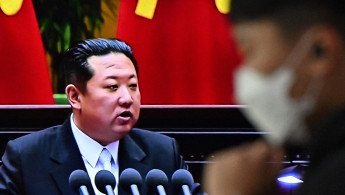At military parade, Kim vows to boost North Korea's nuclear arsenal
North Korea will rapidly accelerate development of its nuclear arsenal, leader Kim Jong Un said while overseeing a vast military parade showcasing his most powerful intercontinental ballistic missiles, state media reported Tuesday.
Despite biting sanctions, North Korea has doubled down on Kim's military modernisation drive, test-firing a slew of banned weapons this year while ignoring US offers of talks -- as analysts warn of a likely resumption of nuclear tests.
Dressed in white military uniform trimmed with gold brocade, Kim watched as tanks, rocket launchers and his largest ICBMs were paraded through Pyongyang late Monday for the founding anniversary of North Korea's armed forces, state media reported.
Kim vowed to "strengthen and develop our nation's nuclear capabilities at the fastest pace," according to a transcript of his speech at the event published by the official Korean Central News Agency.
Repeated negotiations aimed at convincing Kim to give up his nuclear weapons programmes have come to nothing, and he warned Monday that he could use his atomic arsenal if North Korea's "fundamental interests" were threatened.
"The basic mission of our nuclear force is to deter war, but our nuclear weapons cannot be bound to only one mission," he said, according to the KCNA transcript.
North Korea had paused long-range and nuclear tests while Kim met then-US president Donald Trump for a bout of doomed diplomacy, which collapsed in 2019.
Last month Pyongyang test-fired an ICBM at full range for the first time since 2017, and satellite imagery shows signs of activity at a nuclear testing site, which was purportedly demolished in 2018 ahead of the first Trump-Kim summit.
Kim's messaging on the purpose of his nuclear weapons could be a response to South Korea's new hawkish, conservative President-elect Yoon Suk-yeol, who takes office May 10, analysts said.
"It's noteworthy that Kim is now talking more specifically about the purpose of his nuclear weapons," said Yang Moo-jin, a professor at the University of North Korean Studies.
"South Korea's president-elect Yoon has threatened a pre-emptive strike on Pyongyang if needed, and Kim seems to be indirectly saying that he may have to respond with nuclear tactics should Yoon indeed proceed."
Cheong Seong-chang, a senior researcher at the private Sejong Institute, told AFP Kim could have been sending a coded message by wearing his white uniform with the marshal's star -- North Korea's highest military rank.
"It symbolises his ultra-strong stance to the incoming Yoon Suk-yeol administration, who has identified the North as its enemy and said it plans to develop the ability to launch pre-emptive strikes."
Photographs showed huge black-and-white missiles on mobile launchers driving through Pyongyang's Kim Il Sung Square, as North Koreans in traditional dress waved flags and flowers.
KCNA said the parade had showcased the North's most sophisticated weaponry, including the Hwasong-17 ICBM, which it claims to have successfully tested on March 24.
At the time, state media trumpeted the "miraculous" launch of the country's most advanced ICBM, publishing dramatic photos and videos of leader Kim personally overseeing the test.
But analysts identified discrepancies in Pyongyang's account, and South Korean and US intelligence agencies have concluded that North Korea actually fired a Hwasong-15 -- a less-advanced ICBM which it had already tested in 2017.
"For all the hype and months of practice, Monday's North Korean military parade didn't really show many novel capabilities," said Chad O'Carroll of Seoul-based specialist website NK News.
"Stills suggest this was largely a re-rerun of the spectacular and ground-breaking Oct. 2020 parade, albeit with a handful of new items thrown into the show," he added in a tweet.
North Korea stages military parades to mark important holidays and events, often featuring thousands of goose-stepping troops followed by a cavalcade of armoured vehicles and tanks and culminating with the key missiles Pyongyang wants to display.
Observers closely monitor these events for clues on North Korea's latest weapons development.





 Follow the Middle East's top stories in English at The New Arab on Google News
Follow the Middle East's top stories in English at The New Arab on Google News


